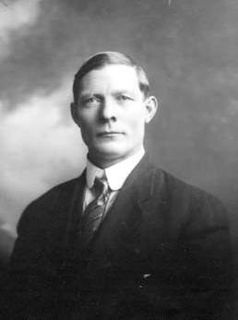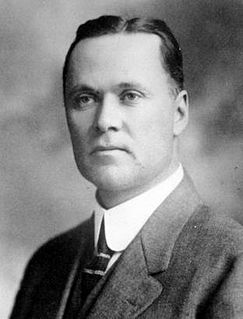The second of two 1912 municipal elections was held December 9, 1912 to elect a mayor and five aldermen to sit on Edmonton City Council and three trustees to sit on each of the public and separate school boards.
The 1915 municipal election was held December 13, 1915 to elect a mayor and five aldermen to sit on Edmonton City Council and four trustees to sit on each of the public and separate school boards.
The 1919 municipal election was held December 8, 1919 to elect a mayor and five aldermen to sit on Edmonton City Council and four trustees to sit on the public school board. T P Malone, Paul Janvrin, T S Magee, and Joseph Henri Picard were acclaimed to two-year terms on the separate school board. In the election's only plebiscite, Edmontonians rejected a proposal to pay their aldermen.
The 1921 municipal election was held December 12, 1921 to elect a mayor and seven aldermen to sit on Edmonton City Council and four trustees to sit on the public school board. F A French, Paul Jenvrin, Thomas Magee, and Joseph Henri Picard were acclaimed to two-year terms on the separate school board.
The 1922 municipal election was held December 11, 1922 to elect a mayor and six aldermen to sit on Edmonton City Council and three trustees to sit on the public school board. R Crossland, P M Dunne, Joseph Gariépy, and J J Murray were acclaimed to two-year terms on the separate school board.
The 1925 municipal election was held December 14, 1925 to elect a mayor and seven aldermen to sit on Edmonton City Council and four trustees to sit on each of the public and separate school boards. In the election's only plebiscite, the voters also rejected a proposal to increase the mayor's term from one year to two.
The 1926 municipal election was held December 13, 1926, to elect a mayor and six aldermen to sit on Edmonton City Council and three trustees to sit on the public school board. Harry Carrigan, J O Pilon, and W D Trainor were acclaimed to two-year terms on the separate school board.
The 1927 municipal election was held December 12, 1927 to elect a mayor and five aldermen to sit on Edmonton City Council and four trustees to sit on each of the public and separate school boards. There were also two plebiscite questions.
The 1930 municipal election was held November 12, 1930 to elect a mayor and five aldermen to sit on Edmonton City Council and four trustees to sit on the public school board, while three trustees were acclaimed to the separate school board. This was the first election to be held in November; where elections had previously been held on the second Monday of December, beginning in 1930 they were held on the second Wednesday of November to encourage voter turnout.
The 1931 municipal election was held November 11, 1931 to elect a mayor and five aldermen to sit on Edmonton City Council and four trustees to sit on the public school board, while four trustees were acclaimed to the separate school board.
The 1932 municipal election was held November 9, 1932 to elect a mayor and five aldermen to sit on Edmonton City Council and three trustees to sit on the public school board, while three trustees were acclaimed to the separate school board.
The 1934 municipal election was held November 14, 1934 to elect a mayor and six aldermen to sit on Edmonton City Council and three trustees to sit on each of the public and separate school boards.
The 1935 municipal election was held November 13, 1935 to elect a mayor and five aldermen to sit on Edmonton City Council and four trustees to sit on the public school board, while four trustees were acclaimed to the separate school board. Voters also approved a requirement that candidates for city council be required to own property.
The 1936 municipal election was held November 12, 1936 to elect a mayor and five aldermen to sit on Edmonton City Council and three trustees to sit on the public school board, while three trustees were acclaimed to the separate school board. Voters also rejected a proposal to extend the mayor's term to two years. The election would normally have been held on November 11, but was delayed by a day owing to the Armistice Day holiday.
The 1939 municipal election was held November 8, 1939 to elect a mayor and five aldermen to sit on Edmonton City Council. Elections for school trustees were not held, as candidates for both the public and separate boards were acclaimed.
The 1940 municipal election was held November 13, 1940 to elect a mayor and seven aldermen to sit on Edmonton City Council. Elections for school trustees were not held, as candidates for both the public and separate boards were acclaimed.
The 1941 municipal election was held November 12, 1941 to elect a mayor and five aldermen to sit on Edmonton City Council and four trustees to sit on the public school board, while four trustees were acclaimed to the separate school board.
The 1944 municipal election was held November 1, 1944 to elect a mayor and five aldermen to sit on Edmonton City Council and three trustees to sit on the public school board, while three trustees were acclaimed to the separate school board. This was the first election to be held on the first Wednesday of November rather than the second Wednesday, in order to avoid future conflicts with the Armistice Day holiday, as happened in 1936 and 1942.
The 1945 municipal election was held November 7, 1945 to elect a mayor and five aldermen to sit on Edmonton City Council and five trustees to sit on the public school board, while four trustees were acclaimed to the separate school board.
The 1948 municipal election was held November 3, 1948 to elect five aldermen to sit on Edmonton City Council. There was no mayoral election, as Harry Ainlay was in the second year of a two-year term. There were no elections for school trustees, as candidates for both the public and separate boards were acclaimed.








